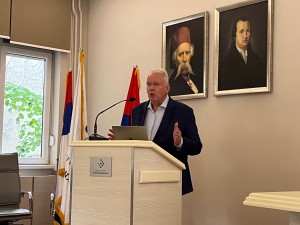 Hannes H. Gissurarson, Professor Emeritus of Politics at the University of Iceland, gave a talk about the proper role of government at a meeting held by the Faculty of Economics at the University of Belgrade in Serbia on 22 April 2024. He recalled the parable of the Good Samaritan. On the road from Jerusalem to Jericho, a traveller had been robbed by some highwaymen, and he lay helpless by the road. When they saw him, a priest and a Levite moved to the other side of the road and passed by, whereas a Samaritan came to the aid of the victim, moved him into a hostel and paid for his necessities. Gissurarson said that this parable illustrated the most important task of government, to keep law and order so that highwaymen would not threaten travellers. It was to make the roads safe.
Hannes H. Gissurarson, Professor Emeritus of Politics at the University of Iceland, gave a talk about the proper role of government at a meeting held by the Faculty of Economics at the University of Belgrade in Serbia on 22 April 2024. He recalled the parable of the Good Samaritan. On the road from Jerusalem to Jericho, a traveller had been robbed by some highwaymen, and he lay helpless by the road. When they saw him, a priest and a Levite moved to the other side of the road and passed by, whereas a Samaritan came to the aid of the victim, moved him into a hostel and paid for his necessities. Gissurarson said that this parable illustrated the most important task of government, to keep law and order so that highwaymen would not threaten travellers. It was to make the roads safe.
Three other conclusions could be drawn from the parable: 1) The Samaritan had sufficient time and money to help. This was an argument for people of independent means. 2) The Samaritan had done good at his own expense, unlike leftists who always wanted to do good at other people’s expense. 3) The two intellectuals had passed by, probably thinking like modern leftists that somebody else ought to pay, not themselves.
Gissurarson said that the two uncontested tasks of government were protection against local scoundrels and foreign rogues, which implied the operation of a police force and a judicial system, and a military. The private sector could provide most other goods, although government might finance some of them, such as primary education. However, in the last one hundred years the public sector had taken on many more tasks. The welfare state had grown rapidly, even though the real need for it had greatly diminished with increasing general prosperity, more job opportunities, improved health and more generous pensions. Gissurarson recalled that the American economist and Nobel Laureate James M. Buchanan had estimated that probably the state needed only 15 per cent of GDP, gross domestic production, to fulfil its necessary role satisfactorily.


